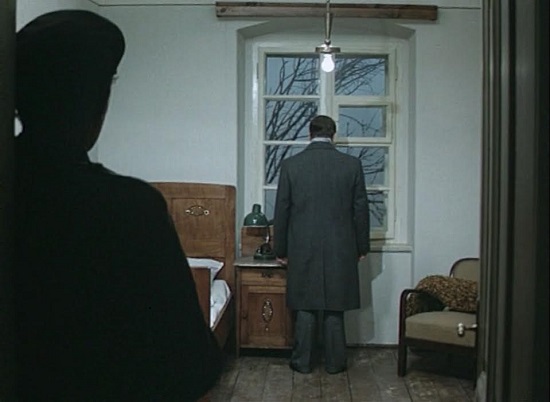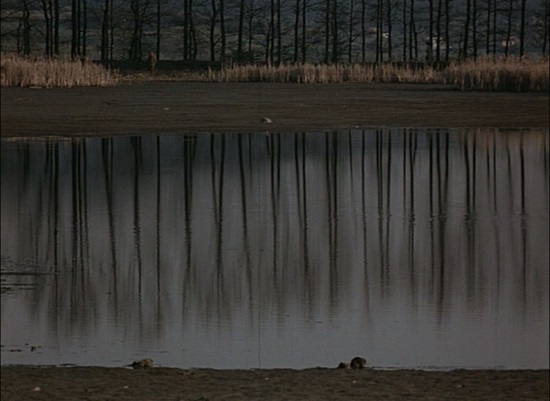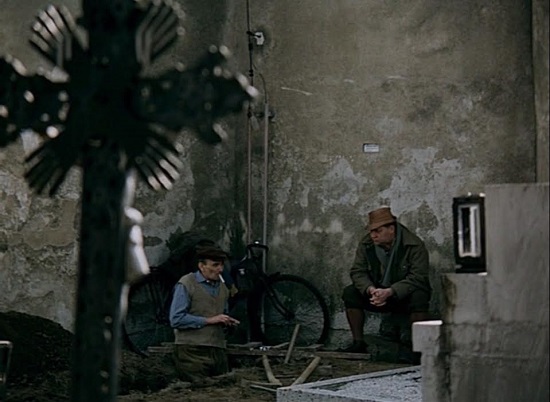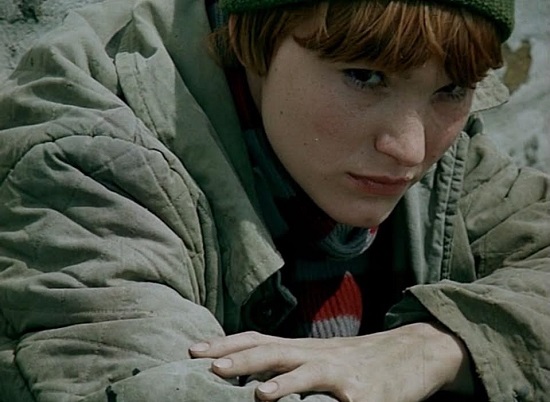A lot can happen to a filmmaker in three short years, and in the case of the Czechoslovakian director František Vláčil, that was all the time it took for a near-total reversal of fortunes. In 1967, his astonishing widescreen medieval epic Marketa Lazarová was trumpeted as the national masterpiece, and yet his two follow-ups — Valley Of The Bees (1968) and Adelheid (1970) — were considered worryingly subversive by the Communist authorities, and he found himself unable to direct another feature film for a further six years. Made in 1976 and released in spring of the following year, Smoke On The Potato Fieldsfeels like the work of another man. It’s an understated return to the form: quiet, troubled, somewhat downtrodden, and caught between acceptance and resignation.
I’m overdue for another viewing of Marketa Lazarová, which was difficult to follow but possessed of maybe the best black-and-white cinematography I’ve ever seen. In recreating the panoramic violence, wonder and fatalism of the European middle ages, it’s second to none (with Valley Of The Bees not far behind), and for its imagery alone deserves to be mentioned alongside his easterly contemporaries Paradjanov and Tarkovsky. But these intense historical dramas aren’t representative of his style across the board. His debut The White Dove (1960) is a foundational Czech New Wave film inasmuch as it predates the first features of other leading figures such as Věra Chytilová, Milos Forman and Jiří Menzel. It also feels rather ‘French’ in sensibility, suggesting that the subsequent generation still needed a few more years to distinguish itself from the Nouvelle Vague.
The artistic freedom permitted to the Czech film industry throughout the 1960s was to be short-lived. The devastating political charge of genius animator and puppeteer Jiří Trnka’s final short The Hand (1965) managed to slip the net, as did Jan Němec’s A Report On The Party And The Guests in 1966, although the President was said to have been enraged by its anti-authoritarian stance. Chytilová’s wildly stylised feminist food-fight Daisies (also 1966) was a step too far, and both she and Němec were soon banned from making films until well into the following decade. Milos Forman’s satirical 1967 realist-farce The Fireman’s Ball, released on the very cusp of the Prague Spring, managed to stay un-banned only until the arrival of the Warsaw Pact invasion forces in August of the following year. All liberalisation of the arts was quickly reversed as part of ‘normalisation’ — the forcible return of Soviet-styled repression that lasted a further eighteen years. Trnka died in December 1969, after which The Hand was immediately repressed. Forman and other filmmakers left the country.

František Vláčil stayed. His treatment was ultimately less harsh than that of the younger New Wave artists, whose works contained more pointed and daring criticism of social standards and the Communist authorities. He found work in the intervening years, making documentaries and children’s shorts for television, and Smoke On The Potato Fields seems a continuation of those working formats: a narrower frame, unexaggerated colour, a contemporary setting, and probably a lower budget too. It’s the story of a middle-aged physician returning to Czechoslovakia from France to work in a humble and provincial town clinic. He’s clearly overqualified, having left behind an apparently illustrious position, a place among influential social circles, and even his wife, who is present in the opening scene only to demonstrate the irreconcilable rift between the two of them. She can’t understand it. Later, in a voiceover, he tells her "I’m returning to myself."
It’s also a return for the great Czech actor Rudolf Hrusínský, who had been similarly suppressed for several years — he has no credits at all between 1972 and 1976. A prolific performer throughout the 1960s, he had worked with many of the country’s top directors. For Juraj Herz, he had starred in The Cremator (1969) as a deeply sinister crematorium manager in 1930s Prague, whose constantly verbalised stream of mangled Eastern and Western philosophies leads him to Nazi collaboration and, ultimately, to become an architect of the Holocaust itself. (Herz survived Auschwitz and Ravensbrück, and is still an active filmmaker today: he contributed a short to the anthology film Slovensko 2.0 in 2014.) Hrusínský is chilling in the role; portly, well turned out, middle class and affluent, he is the dogma-spouting face of heartlessness.
Blacklisted shortly after for his anti-communist stance, the actor’s return in Smoke On The Potato Fields is entirely different. Here he is withdrawn and sad, still physically imposing at times but with the weight of the years visible in his face and stance. (His ability to play both threatening and forlorn characters with equal naturalism recalls Edward G. Robinson at his best.) Dr. Meluzin has no friends here, and his arrival ruffles the feathers of a few stubborn folk, seemingly for no other reason than that he represents a small change to the town’s everyday life.

Hrusínský’s innate presence is absorbing enough onscreen as he quietly surveys his new surroundings, attempting to be decent and professional in an unwelcoming place with its own share of dramas that needn’t concern him. But the film lights up from the very first close-up of Marketa, a teenage farm girl and ex-girlfriend of the doctor’s moody young assistant. She is daring and self-possessed, something of a firebrand, and would be played by Mia Wasikowska in a remake (if the angelic Australian could master the sharpness of the Eastern European character).
What follows is a patient and skilfully made human drama, with Dr. Meluzin diligently performing his duties as he reconciles himself to this unglamorous homecoming. Occasional snippets of voiceover offer clues as to what he’s left behind in France: certainly a long marriage, possibly also a child. Opportunities arise for him to come to the aid of several townspeople, and we observe the indignities and pressures imposed upon them by a way of life that offers little in the way of genuine opportunity. Vlacil flexes a few of his old stylistic muscles in the film’s final third, but generally the strongest surviving element of the Czech New Wave’s 1960s heyday is the sprinkling of black humour throughout the script, particularly the gravedigger who teases Dr. Meluzin by calling him his "colleague". The sour and respectful banter between these two men comes to reveal their weatherbeaten natures. Fatalism and a gentle absurdity hovers around them both.

There is a plot, of course, but it’s such a simple one that even a gloss of it here would be as good as a spoiler. More interesting are the enigmas that can be felt playing around its edges. It’s nowhere near a direct critique of the hard years between the Soviet invasion and the (eventual) Velvet Revolution of 1987, but Dr. Meluzin’s experience has been palpably coloured by his time away from a Communist country. We can feel his disconnectedness, and the passage of time spent elsewhere. He has been drawn back to a place that everyone believes to be inferior — both his abandoned wife and the local official who shows him to his lodgings. The doctor himself never tips his hand. Inferior or not, his roots lie here, and he is able to achieve a certain grounding (if not happiness) in the fishing spots and potato fields he knew as a boy, and in his capacity to help ordinary people, even if tragedy is never too far away.


